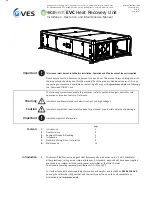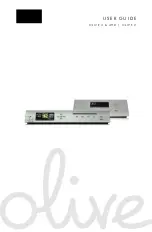
crease the volume of your pre/pro or receiver
until it reaches 75 or 85 dB on your SPL meter.
Remember this number as this will be “reference
level”*. Remember to check with your unit’s
manual to determine if they use a 75 or 85 dB
test tone.
*What is “Reference Level?”
Reference level allows for peaks of 105 dB from
the speakers and 115 dB for the LFE (low fre-
quency effects) channel. When calibrated as
above, the correct relative volume of each
speaker is as the director/sound engineer of the
film intended.
5.2 Setting “Small” or “Large”
Like many things audio related, this is somewhat
subjective, but it’s also a function of your room.
By a good majority, most rooms will obtain their
best sound with all speakers set to "small" with
the receiver’s internal crossover setting engaged
at 80 Hz-100 Hz. This is assuming a high per-
formance subwoofer, as a good sub, ideally
placed, will handle sub-80 Hz –100 Hz informa-
tion better than "most" loudspeakers in "most"
rooms. This is mainly due to the tendency for
competing sources of information below 100 Hz
that result in destructive bass wave cancellation,
thus effectively eliminating the amount of total
information you hear at the listening position.
However, in addition to the greater overall out-
put, an 80 Hz—100 Hz crossover setting will al-
low your other loudspeakers to play with greater
ease and less distortion— free from the demands
of deep and complex sub-100 Hz waveform re-
production. Your speaker system amplifier will
see some benefit as well, since much of the
stress of producing deep bass will be eliminated,
and handled solely by the integrated 100W am-
plifier featured in your SW-8 subwoofer. Conse-
quentially, your front loudspeakers will sound
cleaner and more controlled.
The easiest way to test different methods and
frequencies for crossing over your subwoofer is
by using bass sweeps from the "
AVIA Guide To
Home Theater
" DVD. Specifically, the tones that
descend in frequency from the individual satellite
speakers to the subwoofer are quite useful and
effective. Using your SPL meter, watch for the
smallest amount of overall needle fluctuation
while you direct and descend the tones from
speaker to subwoofer going around your system.
Section 6-Proper Care and Feeding
Your system should now be fully set up, and con-
figured for optimum performance in your room.
We hope this information has been straightfor-
ward and easy to follow. However, should you
have any further questions or concerns that have
not been addressed in this guide, please feel free
to contact our support team at any time. You
may either call us at 877-543-7500 or simply e-
mail us at [email protected].
6.1 Speaker Break In
Many audiophiles believe a component's sound
quality improves with use. With speakers in par-
ticular, this belief has basis in fact. With Rocket
Tyke Series speakers, you'll notice an improve-
ment in timbre, responsiveness, and sheer musi-
cality during the first few weeks you use them.
That's because, like all electro-mechanical de-
vices, the drivers, especially the suspension ele-
ments that keep everything properly centered as
they move in and out to produce sound, "settle
in" with use. How long should you wait until
your Rocket Tyke Series speakers are ready to
sing? That depends on the kind of music or
movie soundtracks you play and the volume you
feel comfortable with. If you regularly listen to
AM radio at low volume, give your products
about 100 hours to get comfortable. If, on the
other hand, you favor orchestral music at levels
you'd experience at Carnegie Hall, you won't
need that kind of patience.
6.2 Speaker Care
Your Rocket Tyke Series speakers don't need
much maintenance. Dust them occasionally.
The durable brushed aluminum finish requires
only some dusting, but can be wiped with a wa-
ter-damp, soft cloth. Please do not try to push in
the drivers with an aggressive finger! In fact, the
tweeters are somewhat fragile so they should
not be touched. Above all, listen and enjoy!
That's what your Rocket Tyke Series speakers
were designed for. And why AV123 takes such
pride in bringing them to you!
6.3 Stay in Touch!
Remember that personalized tech support is only
a phone call away. Call USA toll-free (877) 543-
7500, or worldwide (303) 543-7500. Whether
you need our help, or you have some sugges-
tions to make Rockets even better, or you simply
































